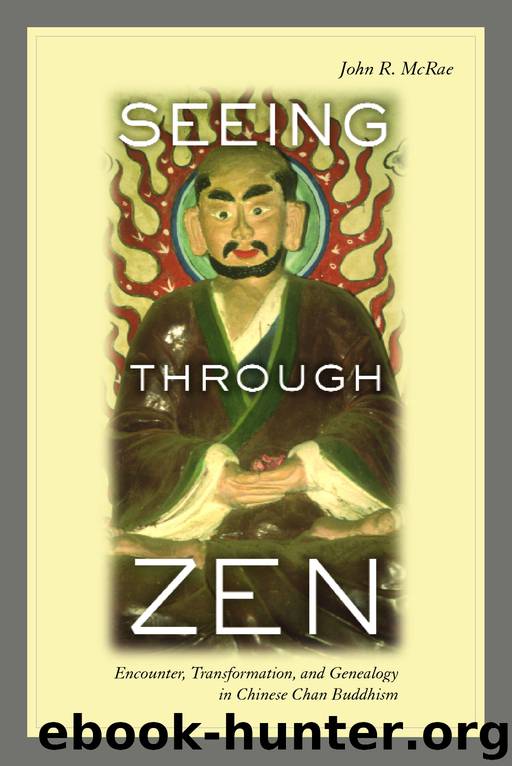Seeing through Zen by Mcrae John R

Author:Mcrae, John R.
Language: eng
Format: epub
ISBN: 9780520937079
Publisher: University of California Press
The texts of encounter dialogue are thus several steps removed from the actual participation in encounter dialogue itself. Before considering the age in which those texts were published—the Song dynasty—we should consider the institutional transformations that occurred in Chinese Buddhism from the Tang to the Song.
CHAPTER 5
Zen and the Art of Fund-Raising
Religious Vitality and Institutional Dominance in the Song Dynasty
Against the “Zen of Anything”
Once or twice at formal academic meetings I have introduced papers with a dramatic reading of forty or fifty book titles that include the word “Zen.” The most widely known example nowadays is Robert Pirsig’s novel Zen and the Art of Motorcycle Maintenance, but this is merely one member of a very large genre. Beginning with Eugen Herrigel’s classic, Zen and the Art of Archery (which has recently become the subject of some dispute),1 such works include Zen and the Art of the Macintosh, Zen and the Art of Windsurfing, Zen and the Art of the Internet, Zen and the Art of Cubing: In Search of the Seventh Side (whatever that subtitle might mean!), and Why Toast Lands Jelly-Side Down: Zen and the Art of Physics Demonstrations. In addition to landmark works by D. T. Suzuki and Alan Watts such as The Zen Doctrine of No-Mind, Zen and Japanese Culture, and The Way of Zen, there are also any number of “The Zen of” books, such as The Zen of International Relations, The Zen Teachings of Jesus, and The Zen of Oz: Ten Spiritual Lessons from Over the Rainbow. A single author has written books entitled Zen Computer and Zen Sex: The Way of Making Love—I have not actually seen either of these, but I hope they are very different in style! The late Bhagwan Shree Rajneesh (1931–90), who adopted the name “Osho” toward the end of his life in misinformed deference to the Zen tradition,2 wrote a number of books explaining the ideas and texts of Zen, one of which is a lengthy tome with the snappy title of Zen, Zest, Zip, Zap, and Zing. And recently there has appeared The Complete Idiot’s Guide to Zen Living, by two medical and mental health professionals without any apparent contact with the Zen tradition at all.
Some of these “Zen and whatever” volumes are good books in their own rights, but taken as a whole they perpetuate a perfectly banal misapprehension of one of the world’s great religious traditions. It seems that virtually anyone can claim authoritative understanding of Zen, or at least be comfortable in using the word Zen in works totally unrelated to the tradition. It would not do to become too indignant, since this sort of exploitation is but the inevitable side-effect of D. T. Suzuki’s missionary success, through which Western interest in Zen and other matters oriental was initially piqued. Nevertheless, we may recognize that, in contrast to its usage within East Asian Buddhism, the word Zen has a very different and much more limited range of meaning in contemporary world popular culture. The popular
Download
This site does not store any files on its server. We only index and link to content provided by other sites. Please contact the content providers to delete copyright contents if any and email us, we'll remove relevant links or contents immediately.
The Way of Zen by Alan W. Watts(6614)
Ego Is the Enemy by Ryan Holiday(5450)
The Art of Happiness by The Dalai Lama(4130)
The Book of Joy by Dalai Lama(3986)
Why Buddhism is True by Robert Wright(3453)
Spark Joy by Marie Kondo(3302)
Shift into Freedom by Loch Kelly(3199)
Happiness by Matthieu Ricard(3049)
A Monk's Guide to a Clean House and Mind by Shoukei Matsumoto(2915)
The Lost Art of Good Conversation by Sakyong Mipham(2654)
The Meaning of the Library by unknow(2572)
The Unfettered Mind: Writings from a Zen Master to a Master Swordsman by Takuan Soho(2311)
The Third Eye by T. Lobsang Rampa(2267)
Anthology by T J(2213)
Red Shambhala by Andrei Znamenski(2199)
The Diamond Cutter by Geshe Michael Roach(2062)
Thoughts Without A Thinker: Psychotherapy from a Buddhist Perspective by Epstein Mark(2026)
Twilight of Idols and Anti-Christ by Friedrich Nietzsche(1894)
Advice Not Given by Mark Epstein(1881)
